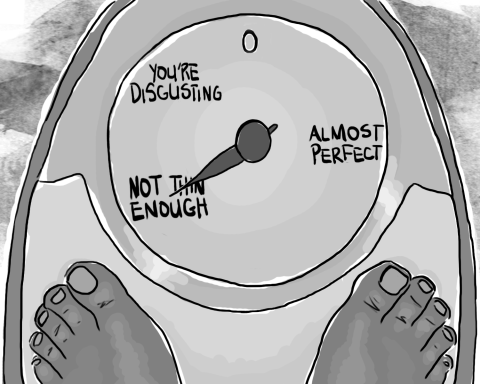How eating disorders are portrayed in the media – Netflix film ‘To The Bone’ and BBC report
- Oct 18, 2018
- 3 min read
Netflix film ‘To The Bone’ - Eating disorder in film
“Anorexia has been reduced to an aesthetic expression and ‘To The Bone’ reflects that.”
The film ‘To The Bone’ is an American Netflix drama film, released in 2017. It stars Hollywood actress Lily Collins and was directed by Marti Noxon. Collins, herself having struggled with an ED in her teen years, plays Ellen – a 20-year-old woman with anorexia. The film shows Ellen as she goes through a series of ups and downs with her eating disorder and meets new people with eating disorders like her. There are many risk with making films around mental illnesses as they may represent the illness badly and have a possibility to be triggering to recovering or suffering audiences. As eating disorders particularly have such a well-known and hard to fake physical manifestation, it is even harder to make a film to avoid these risks.
Research have found that Eating disorder suffers – particularly young girls –are more likely to be influenced by these media images and texts, mainly images of often obtainable bodies. This in mind, it could be argued that the movie could makes the disease appealing to some. With its aesthetic, glamorized representation of the illness, the only thing ‘To The Bone’ provides the audiences struggling with weight and mental health issues is a manual of new tricks for secretly losing a dangerous amount of weight and a new role model in the hip and beautiful skinny Ellen. It disregards its own advice almost immediately about not focusing on food and does so with voyeuristic intensity.
To The Bone can be educational at times for example in its portrayal of behavior associated with anorexia, such as Ellen’s perfect memory for calories contained in foods, her obsessive sit-ups and her preoccupation with the circumference of her arm. However, it is Ellen’s pallid face and emaciated body that is primarily how the viewer is made to understand the illness – as though anorexia is merely a body size or shape or a kind of look. It fails to get across that anorexia is not the loss of excess weight but a mental illness with extensive deterioration on one’s health and also loss of beauty.
There is a petition online demanding that Netflix pulls the show down as it is reportedly triggering for suffers and also as the movie extremely glamorizes the illness. Contrary to what the character of Ellen suggests, anorexia is not all thigh gaps and eyeliner. In reality it comes with extreme thinness or loss of hair, an increase of body hair, being constantly tired and cold as well as extremely dry and cracked skin. There is a thin line between rendering a complex subject filmable and sexing up a serious illness and to the bone crosses it from the first scene. When all the film tells you is that people with anorexia have issues with food which makes them illy thin and unhappy, you have to wonder what the point of the movie is.
I do think the intent of this film was to spread awareness and knowledge of the illness, however as well as doing so have represented eating disorders terribly and produced an extremely glamorised and triggering text that many young girls will watch and get influenced by.
BBC report - Eating disorders in The News
BBC news recently did a report on a serious yet very unspoken of issue to do with people with eating disorders not getting diagnosed due to them not being “thin enough for treatment.” The article is the first I have read that addresses this problem and I think they do it well, with the intention to raise conversation about the issue so something is done about it.
Throughout the report, they make sure to address the problem carefully and are clearly supporting those who suffer from this problem as they repeat facts such as how on average, it takes people 58 weeks to seek help for an eating disorder and a further 27 before they receive treatment from their GP. The use of this shocking fact makes readers realise how much time of your life an eating disorder can affect a person and how if doctor would give them the help they need earlier it would make the world of difference. I think they have done this report as it is an unspoken issue and wish to raise awareness for it but also to gain a popularity and liking to their company for doing so. They have represented GPs badly as they are implying they aren’t doing their job correctly and with the prioritised intent of making the patient better, which is what is expected. This may create a distrust between the audience and the NHS however build a trust between BBC and their audience. They also clearly sympathize incredibly towards suffers of eating disorders which I think is also done to gain a liking to their name.







Comments